Related Research Articles
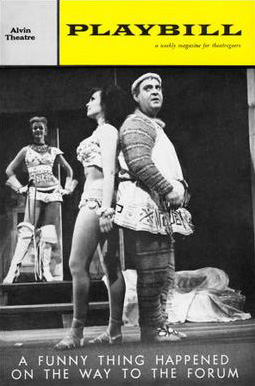
A Funny Thing Happened on the Way to the Forum is a musical with music and lyrics by Stephen Sondheim and book by Burt Shevelove and Larry Gelbart.
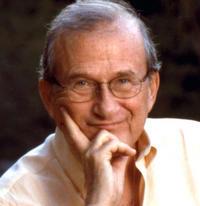
Larry Simon Gelbart was an American television writer, playwright, screenwriter, director and author, most famous as a creator and producer of the television series M*A*S*H, and as co-writer of the Broadway musicals A Funny Thing Happened on the Way to the Forum and City of Angels.
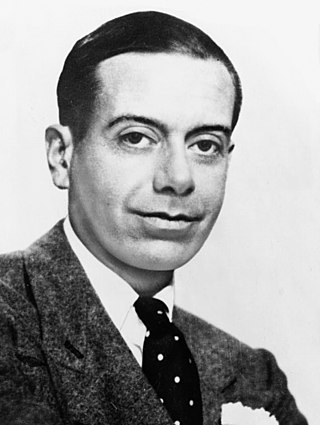
Cole Albert Porter was an American composer and songwriter. Many of his songs became standards noted for their witty, urbane lyrics, and many of his scores found success on Broadway and in film.

No, No, Nanette is a musical comedy with lyrics by Irving Caesar and Otto Harbach, music by Vincent Youmans, and a book by Otto Harbach and Frank Mandel, based on Mandel's 1919 Broadway play My Lady Friends. The farcical story involves three couples who find themselves together at a cottage in Atlantic City, New Jersey, in the midst of a blackmail scheme, focusing on a young, fun-loving Manhattan heiress who naughtily runs off for a weekend, leaving her unhappy fiancé. Its songs include the well-known "Tea for Two" and "I Want to Be Happy".
Burt Shevelove was an American musical theater playwright, lyricist, librettist, and director.
Martin Charnin was an American lyricist, writer, and theatre director. Charnin's best-known work is as conceiver, director, and lyricist of the musical Annie.
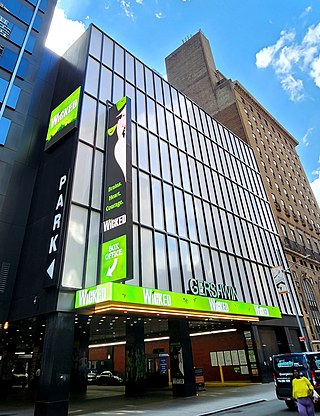
The Gershwin Theatre is a Broadway theater at 222 West 51st Street, on the second floor of the Paramount Plaza office building, in the Midtown Manhattan neighborhood of New York City. Opened in 1972, it is operated by the Nederlander Organization and is named after brothers George and Ira Gershwin, who wrote several Broadway musicals. The Gershwin is Broadway's largest theater, with approximately 1,933 seats across two levels. Over the years, it has hosted musicals, dance companies, and concerts.
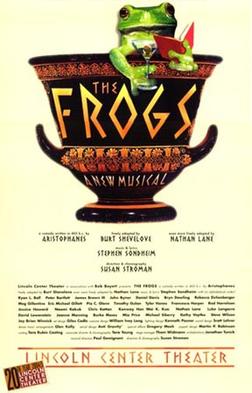
The Frogs is a musical "freely adapted" by Stephen Sondheim and Burt Shevelove from The Frogs, an Ancient Greek comedy by Aristophanes. In the musical, Dionysos, despairing of the quality of living dramatists, travels to Hades to bring George Bernard Shaw back from the dead. William Shakespeare competes with Shaw for the title of best playwright, which he wins. Dionysos brings Shakespeare back to the world of the living in the hope that art can save civilization.
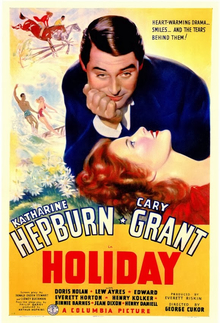
Holiday is a 1938 American romantic comedy film directed by George Cukor, a remake of the 1930 film of the same name. The film tells of a man who has risen from humble beginnings only to be torn between his free-thinking lifestyle and the tradition of his wealthy fiancée's family. The film, adapted by Donald Ogden Stewart and Sidney Buchman from the 1928 play of the same name by Philip Barry, stars Katharine Hepburn and Cary Grant and features Doris Nolan, Lew Ayres, and Edward Everett Horton. Horton reprised his role as Professor Nick Potter from the 1930 version.

Snoopy: The Musical is a musical comedy with music by Larry Grossman, lyrics by Hal Hackady, and a book by Warren Lockhart, Arthur Whitelaw, and Michael Grace. The characters are from the Charles M. Schulz comic strip Peanuts. This sequel to the musical You're a Good Man, Charlie Brown focuses more on the life of Snoopy. Since its premiere, the musical has been a popular choice for regional, international, and amateur theatre performances.
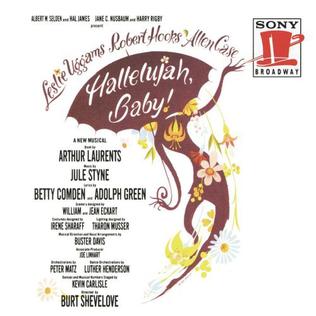
Hallelujah, Baby! is a musical with music by Jule Styne, lyrics by Adolph Green and Betty Comden, and a book by Arthur Laurents. The show is "a chronicle of the African American struggle for equality during the [first half of the] 20th century."
"Just One of Those Things" is a popular song written by Cole Porter for the 1935 musical Jubilee.
Mel Shapiro is an American theatre director and writer, college professor, and author.

Leave It to Me! is a 1938 musical produced by Vinton Freedley with music and lyrics by Cole Porter. The book was a collaborative effort by Samuel and Bella Spewack, who also directed the Broadway production. The musical was based on the play Clear All Wires by the Spewacks, which was performed on Broadway for 93 performances in 1932, and which was filmed in 1933, starring Lee Tracy, Benita Hume, Una Merkel and James Gleason.
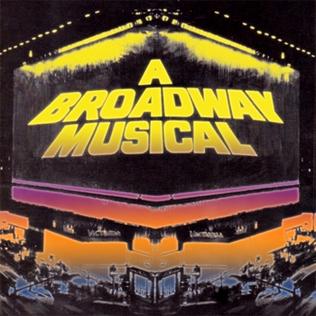
A Broadway Musical is a musical with a book by William F. Brown, lyrics by Lee Adams, and music by Charles Strouse. The Broadway production closed after 14 previews and only one performance on December 21, 1978.

Twang!! is a musical with music and lyrics written by Lionel Bart and a book by Bart and Harvey Orkin, with assistance from Burt Shevelove. The piece, a spoof of the character and legend of Robin Hood, was a disastrous box-office failure and cost Bart his personal fortune.

June Moon is a play by George S. Kaufman and Ring Lardner. Based on the Lardner short story "Some Like Them Cold," about a love affair that loses steam before it ever gets started, it includes songs with words and music by Lardner but is not considered a musical.

Holiday is a 1928 play by Philip Barry which was twice adapted to film. The original play opened in New York on November 26, 1928, at the Plymouth Theatre and closed in June 1929, after 229 performances. It was directed by Arthur Hopkins, set design by Robert Edmond Jones, and costume design by Margaret Pemberton.
Glad To See You was a 1944 American musical comedy. The musical, which involves the adventure of a USO troupe during World War II, was intended for Broadway but flopped, closing after out-of-town tryouts and never opening in New York.
Jeannine Alice Taylor is an American film, stage, and television actress. She is best known for her role as Marcie in Sean S. Cunningham's 1980 horror film Friday the 13th. From 1980 to 1981, Taylor portrayed the lead, Madame Trentoni / Aurelia Johnson, in Robert Kalfin's Off-Broadway production Hijinks! and has had roles in several stage productions including Jenny in The Umbrellas of Cherbourg (1979) and Henrietta in Robert and Elizabeth (1984).
References
Not Since Carrie: Forty Years of Broadway Musical Flops by Ken Mandelbaum, published by St. Martin's Press (1991), pages 220-21 ( ISBN 0-312-06428-4)